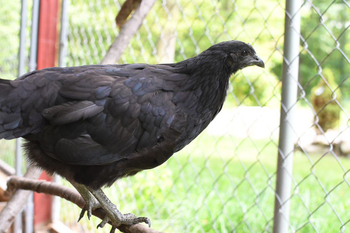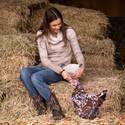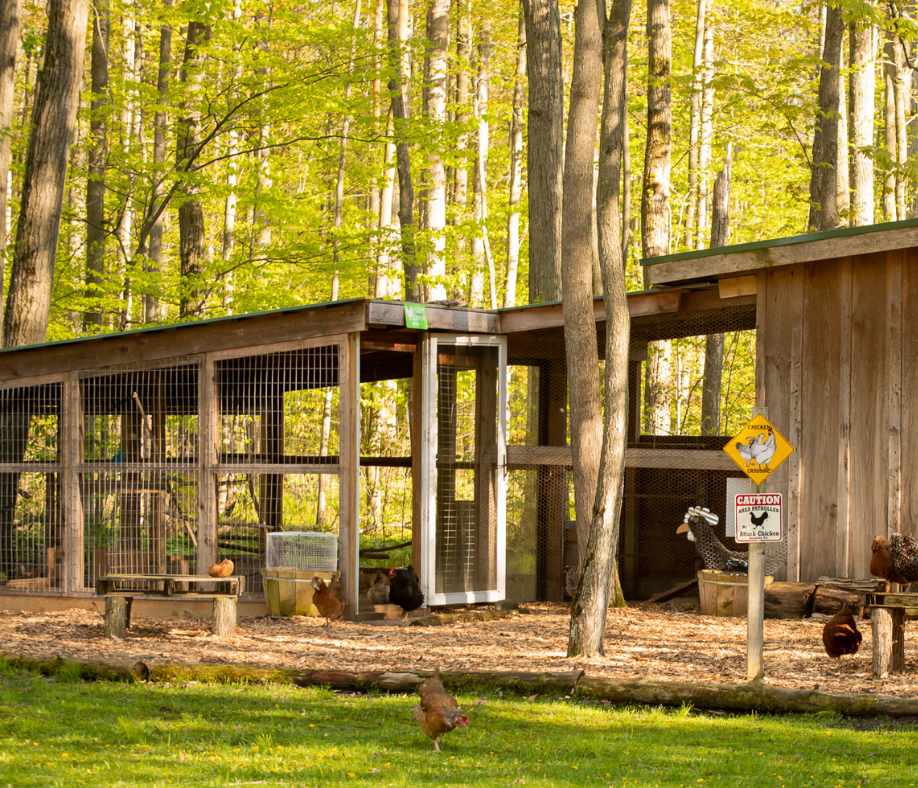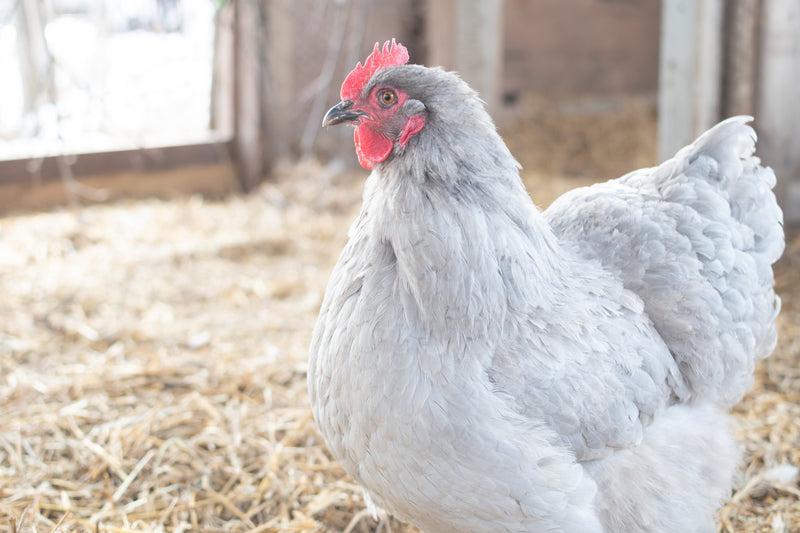Chickens instinctually love to roost! This is why proper roosts are integrated into chicken coop designs. However, sometimes our feathered friends don’t quite get the memo and instead decide to sleep in their nesting boxes. This leads to a wide array of issues such as dirty eggs, overcrowded nesting boxes, and other more. To break this habit and prevent your chickens from sleeping in their nesting boxes, here are the causes and suggestions for encouraging your feathered friends to return to their roosts.
Roosting & Laying Are Instinctual for Chickens
Chickens naturally perform this behavior at dusk every day. They look for a secure, high place to roost at night so that they feel safe as they sleep. Roosting bars in your chickens’ coop provide perching space above the floor of the coop. These provide a sense of security and prevent your chickens from sleeping in soiled litter.
Just as chickens feel compelled to seek out a safe place to sleep, they also naturally feel drawn to lay their eggs in specific conditions. Nesting boxes are the ideal environment for this.
The Problem with Chickens Sleeping in Nesting Boxes
Nesting boxes are a secure, dark place for hens to lay their eggs, not for sleeping in. But why does it matter if your chickens decide to catch some Zs in these boxes?
The issue arises when chickens take to roosting in the nesting boxes instead of the designated roosts in the chicken coop. Letting your chickens roost in the nesting boxes is a bad habit that should be prevented and remedied as soon as possible.
Nesting box sleeping can lead to:
Dirty Nests
Chickens poop a lot at night. If those droppings accumulate in the nesting boxes, it can make for messy nesting box litter that will need to be cleaned out every day.
Dirty Eggs
If the nesting box litter is not cleaned out daily or if eggs are left in the nests overnight, you will have messy, dirty, and stinky eggs to deal with.
Broken Eggs
Eggs that are not collected regularly, are laid later in the day, or are laid early in the morning are more likely to be broken, especially if they are left in the boxes overnight. Broken eggs can lead to egg eating.
Smothering
Sometimes multiple hens will cram themselves into the same nesting box to roost, which can lead to smothering each other or overheating in warm weather.
5 Reasons Chickens May Sleep in the Nesting Boxes

Not only can the bad habit of roosting in the nesting boxes present management problems, but it can also indicate a health problem or ailment. Investigating why your chickens are roosting in the nesting boxes is important for managing them well and keeping them healthy.
#1. Mites
Mites are nasty external parasites that feed off a chicken’s feathers, skin, and blood. These tiny poultry pests can wreak havoc on your flock’s overall wellbeing.
Northern fowl mites and red mites can live both on and off chickens, meaning they can live in the cracks and crevices of roosting bars and the chicken coop. Mites can become so bothersome and painful for your chickens that they will refuse to sleep on their roosts at night. In doing so, they may take to roosting in the nesting boxes. However, the mites will likely begin living in the nesting boxes as well, making it nearly impossible for your chickens to find relief.
Checking for Mites
You can check for mites on your chickens and in the coop. To check for mites on the chickens, pick each chicken up and examine the feathers and skin around the vent. Look for tiny crawling bugs, mite egg masses at the bases of the feather shafts, or bloody bites on the skin.
To check for mites in the coop, you will want to thoroughly examine the roosts and surrounding area, including any cracks and crevices that might afford a hiding place for the mites. Use a plastic knife or sharp blade to poke around in the cracks and crevices. If there is blood on the knife or blade, then you know you have squished some pesky mites.
What to Do If You Find Mites
If you determine that your flock indeed is being bothered by mites, you will want to treat the mites as soon as possible. Treating mites entails treating both the chickens and the chicken coop since the mites live on and off the birds.
#2. Injury & Illness
Disease or injury can also lead to chickens roosting in nesting boxes.
Foot & Leg Injuries
Foot and leg injuries can especially make it hard for a chicken to get up on the roosts. When a chicken hurts their leg, it’s much easier for them to roost in spots like the nesting boxes.
Checking for Leg & Foot Injuries
Do a regular health check on your flock and examine their feet and legs for ailments such as bumblefoot, abrasions, or splinters. During the winter, frostbite can affect the toes of a chicken and make it painful for her to roost. Make sure you take proper precautions during the winter to prevent frostbitten toes, combs, and wattles!
Wing Injuries
Wing injuries can also make it difficult for chickens to fly up to the roosts. A regular health check can also allow you to examine each chicken’s wing to ensure there are no injuries. You can also prevent wing injuries by making sure there is plenty of space in the coop for the chickens to fly down from the roosts and nesting boxes without crashing into something.
Illness
Sick chickens will be less likely to expend the energy needed to fly up to the roosts. A sick chicken may try to hide in the nesting boxes during the day as well to conceal its weakness from the rest of the flock.
An ailing chicken may:
- Act lethargic
- Stand hunched over with ruffled feathers
- Have shriveled and pale comb and wattles
What To Do with a Sick or Injured Chicken
If one of your chickens is sick or injured, move her to an infirmary pen away from the rest of the flock so that she can heal and recover.
#3. A Drafty Coop
Cold drafts that blow into the roosting area of the chicken coop may prevent your chickens from wanting to roost there. Drafts are more of a problem if you live in northern regions and during cold, winter months.
Preventing Drafts
To prevent drafts from blowing on the roosts in the coop, avoid having any windows facing the roosts or directly level with the roosts. You can also check for any cracks or holes in the coop around the roosting section that may allow a cold wind to blow onto the roosts.
Keep in mind that while you want your chicken coop to be draft-free, you also want it to have good ventilation. Having small windows near the roof of the coop, but above the roosts, is a good way to achieve ventilation without creating drafts on or nearby the roosts.
#4. Age, Size, & Breed of Your Chickens
A chicken’s age and breed may play a role in the bad habit of sleeping in the nesting boxes. Older chickens and larger chicken breeds may have a hard time roosting high above the ground.
What to do For Chickens Who Love Sleeping in the Nesting Box
If you have a mixed flock of various ages and chicken breeds, you will want to make sure you provide a variety of roosting options so each bird feels comfortable and can access a proper roosting spot at night.
Have roosts that are at various heights, such as a ladder roost or bar roosts at different heights above the coop floor. Lower roosts will appeal to older chickens and chickens of larger breeds, such as Orpingtons and Cochins. Ideally, heavier chicken breeds should use roosts that are about 2 to 3 feet off the ground to prevent leg injuries and bumblefoot.
You can also build a ramp or stepladder set-up to help older chickens get up onto the roosts without flying.
Silkie chickens and frizzle feathered chickens may have a harder time flying up to roosts because of their unique feathers. Providing low roosts or ramps that lead to roosts can help prevent them from roosting in the nesting boxes.
#5. Bullying
Bullied chickens will look for a safe, dark place to hide away from the rest of the flock. The nesting boxes provide the perfect place. Hens who are being bullied will also be denied access to the regular roosting spots, which will cause them to seek other places to roost and sleep for the night.
What Causes Bullying in the Flock?
Bullying usually occurs when new chickens are integrated too quickly into the flock or if you have a dominant hen with a bully-ish attitude. Bullying can also occur when chickens get bored or if there is not enough coop and enclosure space for everyone.
How to Prevent Bullying
Properly integrating new chickens can do wonders for the flock dynamics. To do so:
- Provide plenty of coop and enclosure space for everyone
- Keep your flock stimulated (mentally and physically)
- Separate any hens who show a tendency to bully other hens
Once the bullying has been stopped, the chicken who was getting bullied may need a little encouragement to start roosting in the proper place again.
How to Get Chickens to Sleep on Roosts

These tips for preventing chickens from roosting in the nesting boxes can be employed both to prevent the habit and to break the habit of roosting in the nesting boxes.
#1. Block Off the Nesting Boxes
One of the easiest ways to stop chickens from roosting in the nesting boxes is to block off the boxes every evening. Depending on how the nesting boxes are set up, you can use a large board, cardboard cut to the proper size, or DIY chicken wire screens to block off the nesting boxes in the chicken coop.
Hens will usually lay their eggs in the morning and early afternoon. So, by blocking the nesting boxes off in the late afternoon or early evening, you can prevent your chickens from accessing the boxes come roosting time. In the morning, you can unblock the nesting boxes so the hens can access them for laying their eggs.
Other Benefits of Blocking Off Nesting Boxes
Blocking off the nesting boxes is also a good idea when you are introducing young pullets to their new coop.
Moving to a new coop can be stressful, and the pullets may look for a dark, safe place to hide and roost. During this time the nesting boxes look especially attractive to them! By blocking off the nesting boxes, your pullets are more likely to learn where the proper places are to roost at night.
If the pullets are not of laying age yet, you can leave the nesting boxes blocked off during the day as well to help train them. Once they reach laying age (usually around 20 to 24 weeks of age), you will want to unblock the nesting boxes during the day to encourage them to lay their eggs in the boxes.
#2. Ensure Proper Roost Height
Make sure the roosts in your coop are of proper material and height to encourage your chickens to choose them for roosting on at night.
Roost Height
Chickens instinctually like to roost up high, so they will seek out the highest place they can access in the coop. The roosts in the chicken coop should always be higher than the nesting boxes to appeal to a chicken’s natural inclination to roost up high.
Roost Materials
The roosts should also be made of proper materials such as branches or sanded boards, so that roosting is comfortable and safe for your flock. Ideally, roosts that are narrow and about 2” wide make for a comfortable and stable roosting place for chickens.
Proper roosts should:
- Be smoother around the edges to prevent cuts or abrasions
- Provide grip without being slippery or rounded
- Be stable or secure
Roosting Space
You will also want to make sure you have plenty of roosting space for the number of birds in the chicken coop. If there is not enough space on the roosts, then some birds may take to sleeping in the nesting boxes.
Make sure there is 8” to 12" of roosting space per chicken. Ensure there is also plenty of space for your chickens to fly up and down from the roosts without crashing into anything else in the chicken coop.
Roosts that are high-up, easy to access, sturdy, and stable will appeal to your flock.
#3. Perform Proper Roost Training
Roost training your flock from the start is the best way to prevent chickens from sleeping in the nesting boxes. Roost training entails teaching young birds from an early age where the proper place is to roost at night.
How to Roost-Train Your Chickens
When introducing young birds to a new coop, you will have to teach them where to roost at night, in a way like what a mother hen does naturally. Every evening you may need to place each young chicken on the roosts in the coop. Eventually, they will catch on and start roosting in the evening on their own.
This roost training can also be accompanied by blocking off the nesting boxes if the young pullets haven’t reached laying age.
If you are introducing new birds to an existing flock, the other flock members should help teach the new arrivals where to roost at night. However, bullying can prevent new chickens from roosting on the regular roosts, and they may take to hiding and sleeping in the nesting boxes.
Follow proper integration methods to prevent bullying of new flock members!
A mother hen will also teach her young chicks when and where to roost at night if provided the opportunity.
#4. Encouraging Broody Hens to Roost
A broody hen does not seek out the nesting boxes for roosting purposes. Instead, she wants to sit on a clutch of eggs to hatch them. However, being broody does mean she should spend a majority of her time in the nesting box and sleep in the nesting box, too.
There are some other tell-tale signs of broodiness if you’re unsure if your hen is broody. For broody hens that you don’t want the hen to hatch eggs, you will have to discourage the hen from being broody.
If you do want her to hatch eggs, it’s a good idea to move her to a separate brooding pen where she won’t be taking up nesting box space and won’t be disturbed by other hens.
Is It Alright for Chickens to Sleep on the Ground or Floor of the Coop?

Letting your chickens sleep in the nesting boxes is a bad idea, but what if a hen or two starts sleeping on the floor of the coop? If they can’t access the nesting boxes and the roosts are still unappealing to them, some chickens may start sleeping on the floor of the coop.
What To Do If Your Chickens Sleep on the Ground
First, evaluate why your chickens might have changed their roosting habits. The same factors that cause chickens to sleep in the nesting boxes may also cause them to avoid roosting altogether. These factors include
- Parasites
- Improper roosting bars
- Bullying
- Illness
- Injury
As long as nothing is wrong with the chicken or the roosting area of the chicken coop, sleeping on the floor of the coop is fine. One thing you don’t want is your chickens sleeping outside of the chicken coop where they’re vulnerable to predators and bad weather.
Provide Your Flock with a Good Night’s Sleep
Every coop should have plenty of roosting options and adequate nesting boxes to keep your flock happy, healthy, and well-rested! Additionally, you can prevent your chickens from sleeping in the nesting boxes by ensuring they stay parasite free and have plenty of space. Remember to check your flock often for injuries or ailments and properly roost training young chickens from the start.
Once your flock knows where to roost at night, chores will become much easier in the morning and your chickens will enjoy partaking in their instinctual sleeping habits.


















